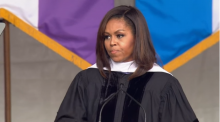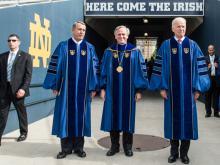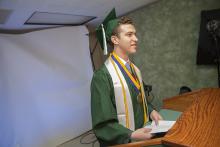commencement

Class of 2024, you are indeed overcomers, but you’re also no strangers to grief, doubt, and other emotions we don’t often acknowledge in commencement addresses. As you accept your well-deserved diploma, I don’t need to tell you that you’re graduating in an unsettling time: uncertainty around the most consequential election of your (and my) lifetime, uncertainty around the future of our planet amid an accelerating climate crisis, and uncertainty as to the outcome of horrific and intractable wars in Gaza, Ukraine, Sudan, and so many other places. You may be uncertain about your job prospects, whether Social Security will remain solvent by the time of your retirement, or whether you will ever be able to afford a home in this overheated housing market. If you’re a Christian, you may feel uncertain about how you can stay in a faith that has so often been distorted from the gospel.

If President Obama’s appearance at the Notre Dame commencement in 2009 sparked an unprecedented uproar among American Catholics, imagine what inviting President Trump to graduation might provoke.
That concern is making Notre Dame’s president, the Rev. John Jenkins, think twice about making a pitch for the incoming U.S. president to receive an honorary degree, an appearance that almost any school would normally covet — and one that the iconic Catholic university has been more successful than others in securing.

"Here in America, we don’t give in to our fears. We don’t build up walls to keep people out because we know that our greatness has always depended on contributions from people who were born elsewhere."

Both politicians spoke of how their families and their Catholic faith, in small personal moments, in joy and in tragedy, had inspired and informed their decades of political service.

When 2,500 students and their families gather on the upstate New York campus for the Watson School of Engineering graduation on Saturday, Greenberg will still take his place at the podium. And on jumbo screens on either side of the stage, he will watch himself deliver the graduation address he taped in the university’s video studio three days earlier.

Author Anne Lamott, one of our favorite Jesus-loving subversives, recently delivered the undergraduate and interdisciplinary studies commencement address at the University of California at Berkeley.
Lamott's funny, irreverent, and yes, profound, words of wisdom for the Berkeley graduates included the following, about what she thinks the "truth of their spiritual identity" might be:
Actually, I don’t have a clue.
I do know you are not what you look like, or how much you weigh, or how you did in school, and whether you get to start a job next Monday or not. Spirit isn’t what you do, it’s … well, again, I don’t actually know. They probably taught this junior year at Goucher. But I know that you feel it best when you’re not doing much — when you’re in nature, when you’ve very quiet, or, paradoxically, listening to music....

Choose carefully those with whom you surround yourself. Pay attention to that which you pursue with all your heart, all your soul and all your might -- and to what compromises you are willing to make in that pursuit. Make those compromises judiciously and with reflection, because when they all add up, you may realize that you’ve become someone you don’t recognize.
Who you will become is determined in large part not by what you acquire, but by what you give -- and how you give of yourself.